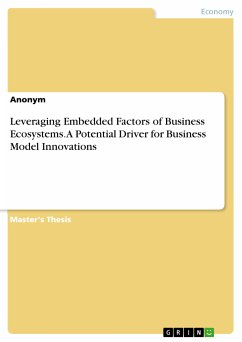
Managing Path-Breaking Innovations (eBook, PDF)
CERN-ATLAS, Airbus, and Stem Cell Research
Versandkostenfrei!
Sofort per Download lieferbar
59,95 €
inkl. MwSt.
Weitere Ausgaben:

PAYBACK Punkte
30 °P sammeln!
Path-breaking innovations are about instigating fundamental changes in people, organizations, communities, and economies. They are complex, continuous, and evolutionary processes that take considerable time, resources, and the efforts of many individuals and organizations to be accomplished successfully. Representing distinct departures from existing practices, they differ from other types of innovation, such as product extensions and incremental improvements. By examining path-breaking innovation processes through in-depth analysis of several large-scale initiatives around the world, the auth...
Path-breaking innovations are about instigating fundamental changes in people, organizations, communities, and economies. They are complex, continuous, and evolutionary processes that take considerable time, resources, and the efforts of many individuals and organizations to be accomplished successfully. Representing distinct departures from existing practices, they differ from other types of innovation, such as product extensions and incremental improvements. By examining path-breaking innovation processes through in-depth analysis of several large-scale initiatives around the world, the authors explore how profound changes in product, process, and service can be explained and managed, and consider the practical implications for scientific, organizational, institutional, and political leaders concerned with channeling innovation toward economic growth. In-depth analysis of science and technology initiatives at CERN-ATLAS, Airbus, and in stem cell research, the authors explore and illuminate how profound changes in product, process, and service can be explained and managed. Covering such issues as organizational culture, types of knowledge, and large-scale project management and resource distribution, the authors consider the practical implications of radical innovation for scientific, organizational, institutional, and political leaders concerned with channeling innovation toward economic growth.













